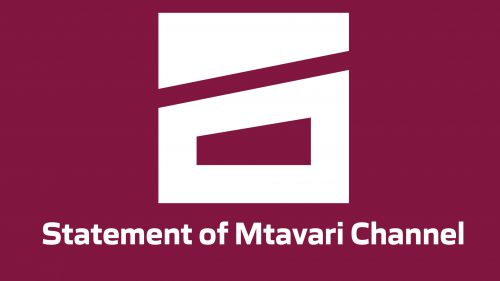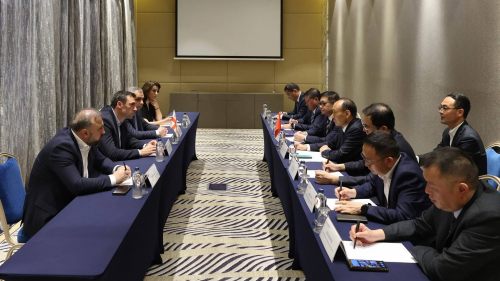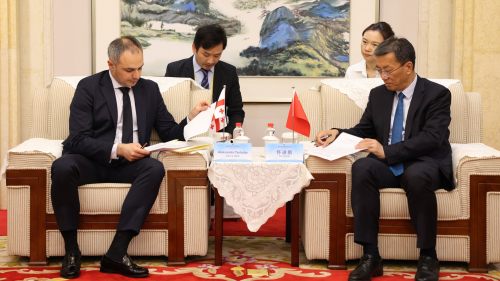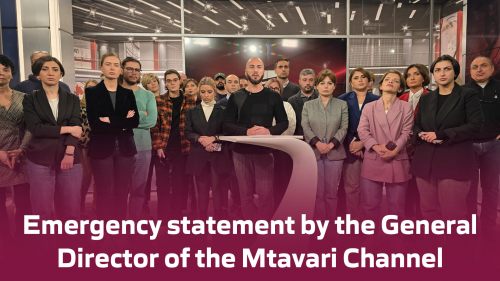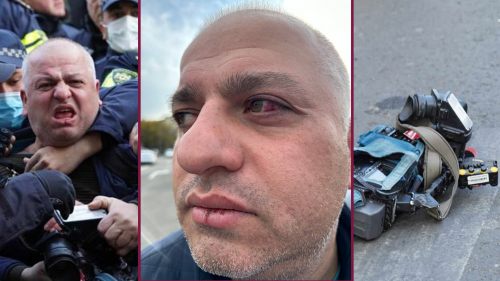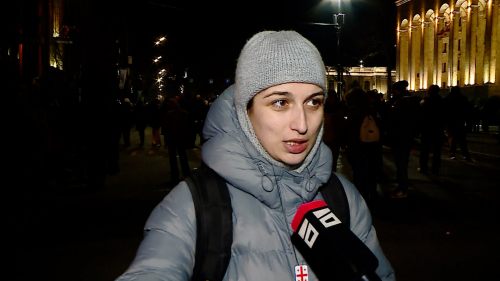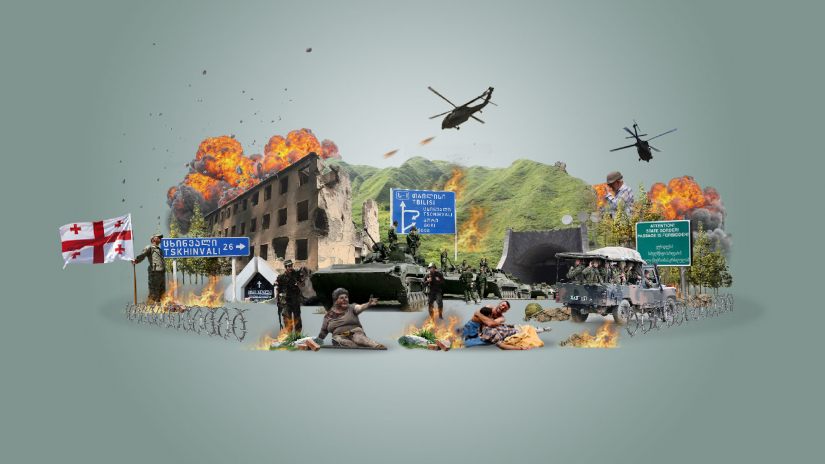
14 years since the August war
14 years have passed since the 5-day war in August; as a result of the intervention of the Russian occupation forces in 2008, 228 civilians, 170 soldiers and 14 policemen were killed. 2,232 citizens of Georgia were injured; there are 263,598 IDPs on the territory of Georgia; Georgia lost control of 151 settlements.
Russia has declared South Ossetia and Abkhazia independent territories.
The "creeping occupation", the seizure of territories and the kidnapping of people continues to this day. Georgian citizens living near the occupation line have to fight for survival every day.
Russia's preparations for the August war
Back in March 2006 Russia began building a military base near the village of Java. In the next 2 years, 2 more bases were added, one of which, Ugardan, is the location of the Russian invasion on August 7, 2008. In July 2008, a group of Russian military doctors also got stationed in Tskhinvali.
Until August, in April-July 2008, in parallel with the construction of bases in the Tskhinvali region, Russia moved more than 500 troops and artillery to Abkhazia.
In parallel with Georgia's Euro-Atlantic aspirations, while Russia was deploying military force, the West recognized Kosovo's independence, alongside this, it was stated at the Bucharest summit that Georgia and Ukraine would join NATO. This became an excuse for Russia to launch military operations.
Who started the war ?! Putin's words put an end to this pointless dispute: "We had a plan, and we acted according to it; it is not secret. I have said before that the General Staff prepared and approved it in late 2006 or early 2007. In my opinion, we worked fully within the confines of this plan, and It was for this reason that we were also preparing the Southern Ossetian People's Army... This plan was agreed with me."
It was after 2008 that it was agreed by the West that Russia, by intervening in Georgia, wanted to block its transatlantic integration
Bucharest Summit
On April 2-4, 2008, at the Bucharest Summit, the question of granting a Membership Action Plan for NATO (MAP) to Georgia and Ukraine was being considered.
The decision of the Alliance was supported by: the United States, Canada, the United Kingdom and a number of European countries.
Opponents included: France, Germany, Spain and the Benelux countries.
German Chancellor Angela Merkel was categorically against granting the MAP. She believed that these two countries were not ready for membership in the Alliance. In this way, Germany sought to avoid a direct confrontation with Russia. The idea of European security was violated by any kind of coercive action, in Europe or in its vicinity.
German resistance played a large role in the decision to deny the MAP. It was said that Georgia and Ukraine would not be able to receive the MAP then, but they would definitely become members of the Alliance. When - at the Bucharest summit was not specified.
Left with the promise instead of the MAP, we were told by the Russian Duma member and Kremlin analyst Sergei Markov that "Georgia's entry into NATO will be seen as an attempt to start a war in the Caucasus. For Ukraine, NATO membership will lead to strained relations with Russia."
August 2008
As early as August, since the spring of 2008, there has been an active movement of Russians, provocative actions and even shootings on the territory of Georgia.
August 1 - Georgian villages in Tskhinvali are bombed, and as a result of fire opened from Ergneti and Nikozi there are injured and wounded, including police officers. 3 people died. In total, 12 Georgian citizens were injured on August 1.
August 2 - More than 10 villages are bombed. 19 were left injured. In order to avoid escalation, the Georgian side ceases retaliatory fire. On the same day, Russia offers assistance to the "authorities" of North Ossetia and the evacuation of the population from Tskhinvali begins.
August 3 - Separatist militias occupy several villages, including Znauri and Velebi. They also opened fire on the Georgian police in Dvani.
August 4 - Russia's 58th Army encamped near the Roki Tunnel. 10 units of armored vehicles enter Georgia from Russia. The threat of war is becoming increasingly apparent. The international community is becoming more active and calls are being made to stop the violence.
August 5 - Russia's 58th Army enters Georgia via the Roki Tunnel. The bombing of Georgian villages continues. The EU continues to call for negotiations and calls for peace.
August 6 - Bombing of Georgian villages continues.
August 7 - The Ministry of Internal Affairs of Georgia seizes radar records, which confirm that several more Georgian villages are planned to be bombed. At the same time, the de facto government of Abkhazia expresses its readiness to assist the separatist regime in South Ossetia.
August 7 - 10 people are killed, 37 are injured, 26 Georgian villages are bombed.
August 7- the Georgian side begins mobilizing. That is why August 7 is considered to be the date of the beginning of the war and not any other day.
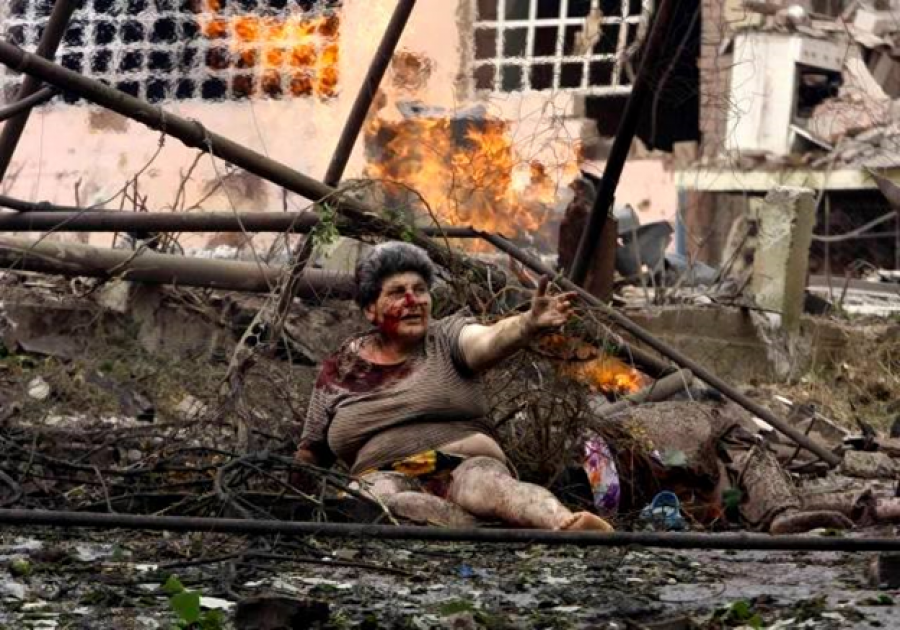
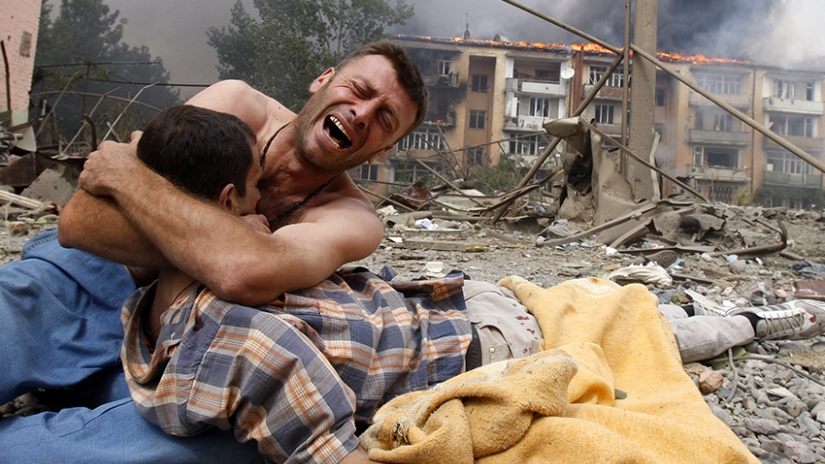
August 8 - 19 killed, 135 injured, 36 villages bombed.
August 9 - Russian Prime Minister Vladimir Putin arrives in Vladikavkaz to conduct a military operation.
Georgian military captures Russian pilot in Gori.
Air attacks - on Poti port, Senaki and Vaziani military bases, Kopitnari airport and Gori. There is also a parallel attack on the Kodori Gorge. At the same time, the Russian Black Sea Fleet enters the territorial waters of Georgia and begins to patrol the coast of Abkhazia.
The Georgian government is withdrawing Georgian military personnel from Iraq to engage in hostilities.
There is a hacker attack on Georgian websites, pictures of Hitler and Saakashvili are posted on the page of the Ministry of Foreign Affairs.
August 10 - The Russians occupy the Great Liakhvi gorge. Extra power enters through the rock tunnel. The Vaziani military base, the Baku-Supsa-Ceyhan oil pipeline and the Kodori Gorge were bombed. The Georgian side is leaving Tskhinvali. The Georgian Foreign Ministry has informed Russia that it is leaving the territory and is demanding a ceasefire.
Gori and Anaklia were bombed, the Georgian side also evacuated the population from Kodori. Georgia is again asking the Russian embassy in Tbilisi to cease fire.
Grigory Karasin announced the terms of the ceasefire - Georgian troops must return to their pre-conflict position and commit to non-use of force.
Nicolas Sarkozy is involved in the talks. Georgia asks Condoleezza Rice for the role of mediator. French Foreign Minister Bernard Kouchner and Finnish Foreign Minister Alexander Stubb will first arrive in Tbilisi and then in Moscow for talks.
August 11 - Despite Western involvement in the talks, Georgian villages and towns continue to be bombed, including in Upper Abkhazia, Adjara and other regions. Russian troops invaded Senaki and Zugdidi.
On the same day, Russian warships block the entrance to the Georgian Black Sea.
Russian tanks are moving in Tskhinvali, villages in the region are being occupied by Russians.
The Georgian Armed Forces fortify the entrance to Tbilisi - there was also a threat of a Russian invasion of Tbilisi.
The Western media is full of articles about Putin and his aggressive actions.
August 12 - A Russian helicopter opens fire on a passenger minibus traveling in the direction of Gori on the highway, killing 9 civilians. Russia's Black Sea Fleet is destroying Georgian coast guard ships. The Russians continue to occupy the villages of Gori district. The Russians are blocking the main highway connecting East and West. The Russians occupy the Kodori Gorge with 70 units of armored vehicles and 600 soldiers. Nicolas Sarkozy has talks to Vladimir Putin.
A resolution on a ceasefire acceptable to the Georgian side, but not to Russia, will be discussed at an emergency meeting of the UN Security Council, proposed by France.
On the same day, according to the Georgian government, 45 soldiers were wounded and 47 civilians were killed, and the number of IDPs was 25,000.
Arriving in Tbilisi were: then US Vice President and Secretary of State Condoleezza Rice; Senator John McCain; President of Estonia Thomas Hendrik Ilves; President of Ukraine Viktor Yushchenko; Prime Minister of Latvia; President of Lithuania Valdas Adamkus; President of Poland Lech Kaczynski. Nicolas Sarkozy would also arrive in Tbilisi after the talks in Moscow.
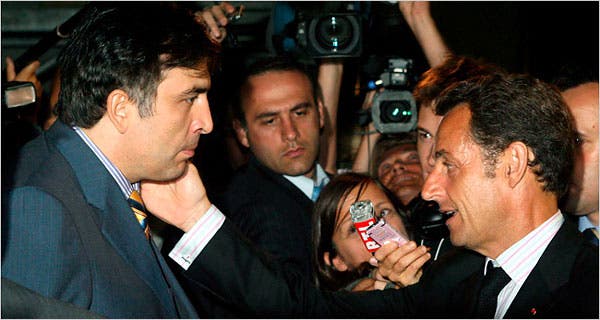
President Mikheil Saakashvili addresses a crowded rally on Rustaveli Avenue and announces the decision of the Georgian government to withdraw Georgia from the CIS.
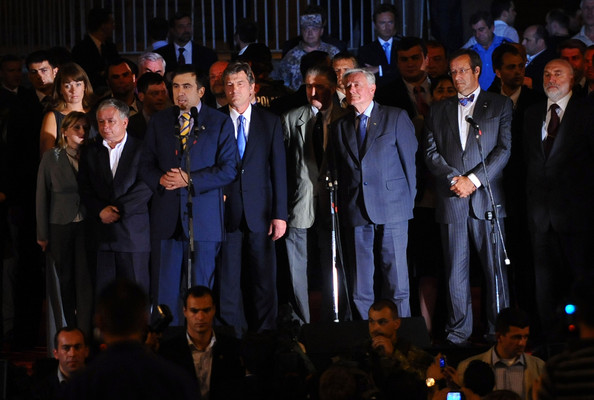
August 13 - US President George W. Bush announces that he will be sending a special envoy to Georgia and France.
Residents of Georgian villages take refuge in forests. According to the Ministry of Internal Affairs, 1040 cases of theft, 89 cases of robbery, 132 cases of burglry, 13 cases of rape, 7 cases of illegal deprivation of liberty and 164 cases of damage to property were registered during these days.
August 14-15 - Tents are set up for IDPs, Russian tanks move again in Gori and Zugdidi. Russian helicopters drop incendiary shells on the forests of Borjomi-Tsemi. The fire in Borjomi and the surrounding area lasted for 26 days.
August 16 - A six-point peace agreement is reached between Georgia and Russia, according to which both sides are to return troops to the pre-war line, and the Kremlin has violated the agreement.
August 26 – The then-Russian President Dmitry Medvedev backs the independence of Abkhazia and South Ossetia. Medvedev blamed the Georgian side for starting the war in August and announced August 8 as the start date of the war.
What was happening in Abkhazia?
On April 17, 2008, Putin sent Russian troops into occupied Abkhazia.
In May, additional military forces were moved into occupied Abkhazia and Tskhinvali.
In July, the de facto government of Abkhazia closed the Inguri bridge.
On August 8, Sergei Bagapsh issued an order declaring the Abkhaz armed forces on alert for assistance to the separatist government of South Ossetia.
Heroes of the August War
The battle of Shindisi took place on August 11, 2008. Seventeen Georgian servicemen were killed in an unequal clash with a Russian unit - Alexandre Oniani, Emzar Tsilosani, Vepkhvia Jishkariani, Zviad Katsadze, Teimuraz Beridze, Ilia Gabunia, Ilia Sheklashvili, Irakli Janelidze, Kakha Koshadze, Levan Melkadze, Marlen Baramia, Mikheil Dvalishvili, Nikoloz Forchkhidze, Roman Zoidze, Ruslan Tsuladze, Felix Kakauridze and Shmagi Kupatadze.
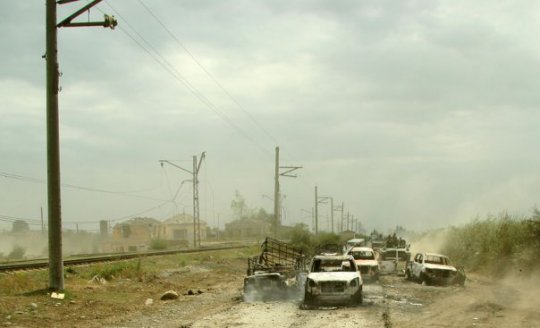
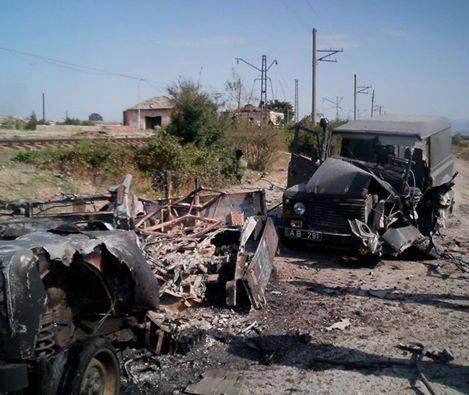
Part of the Shindisi clash is the story of the godfather and the godchild. Junior sergeant Alexander Oniani did not surrender to the enemy and detonated a grenade along with his godson, corporal Roman Zoidze in an act of defiance. Alexander Oniani was posthumously awarded the Vakhtang Gorgasli Order of the first degree and Roman Zoidze was awarded the Vakhtang Gorgasli Order of the third degree.
August 2008 The war has more than a hundred heroes.
Some of them were considered missing for months, 24-year-old Giorgi Antsukhelidze among them. He was considered missing until November 2008. The junior sergeant, captured by Russia on Aug. 9, 2008, was beaten to death in a mass graveyard in Tskhinvali after torture. Russian soldiers filmed the torture on their phones, trying to force him to kiss the ground, kicking him in the back and humiliating him. Footage showing this was released in January 2009.
Giorgi Antsukhelidze was identified through DNA analysis after the bodies of ten Georgians were brought out of Tskhinvali.
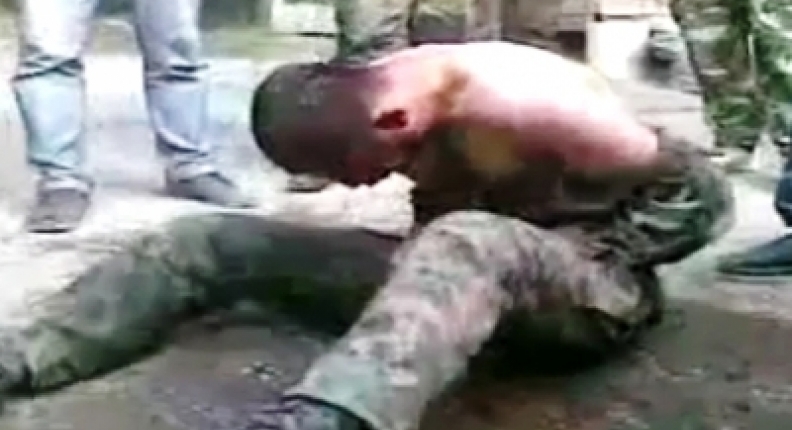
Among the heroes is Shmagi Sopromadze, a 24-year-old soldier who was captured by the Ossetians. He was asked to insult the Georgian flag - he refused. By his hands, the Ossetians figured out that he was a tank crewman and shot the 24-year-old soldier.
Shmagi Sopromadze and Giorgi Antsukhelidze each have 2 children.
"Ana and Levan Antsukhelidze against Russia" - under this name the lawsuit prepared by the Association of Young Lawyers was submitted to the European Court of Human Rights on April 8, 2010.
Glory to the heroes!
Statements of the current president of Georgia about the August 2008 war that are constantly criticized
Salome Zurabishvili - (August 7, 2014) - "Six years have passed... that night Saakashvili opened fire and used missiles against Tskhinval, against his countrymen, citizens of Georgia.... This caused the expected (and previously announced) Russian Military Reaction... He achieved the expected defeat and the "planned" loss of territories... he has not yet been convicted of this crime.... and until he is, Georgia will not be free of Saakashvili's crime (and tnot the countries) and will not be able to hold Russia responsible for the violence and occupation it has committed!"
Salome Zurabishvili (August 6, 2018) - "I always said and say that the war was started a century ago by Russia, then we got involved in Russia's provocation and entered this military situation. Georgia started this part of the war. This is the known and official version for al;, which was also confirmed by the European Union and we will not overlook his, and the tragedy of the war is our tragedy....When you are a small country, you have to be smarter than the enemy."
Salome Zurabishvili (7 August 2020) - "Neither war, nor occupation of 20% of our territories, nor violation of rights and identity of our citizens could affect the sovereignty and independence of Georgia. Russia did not achieve its goal. The war could not change the path of Georgia, it could not stray Georgia from its path, to become a respectable, strong, stable, democratic, independent state. The movement towards Europe and Euro-Atlantic integration has not stopped.
Bidzina Ivanishvili (October 1, 2018) - "...Saakashvili literally led the Russian army, and today 20% of Georgia's territory is occupied. It is outrageous that these traitors are trying to accuse us and call Mrs. Salome a traitor."
Books and Memoirs of the August War
Many books and memoirs have been written about the August War. Twelve years after the war, on July 24, 2020, Nicolas Sarkozy publishes his memoirs, which he calls "The Time of Storms." In his memoirs, he recalls in detail the five hardest days of the August war. Sarkozy also writes that at the end of 2008 it was clear that Georgia had managed to maintain its independence and freedom. Of the 500 pages of Nicolas Sarkozy's memoirs, 13 pages are about Georgia.
Ronald D. Asmus's book was also written about the August 2008 war under the title "The Small War That Shook the World."
The film
"5 Days of August" was filmed in Gori, Vaziani and Tbilisi. The film starred Andy Garcia (President Mikheil Saakashvili), Rupert Friend (American journalist Thomas Andres), Jonathan Schech (officer Revaz Avaliani), Val Kilmer (Dutch journalist working in Georgia) and other actors.



